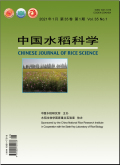中国水稻科学2024,Vol.38Issue(1):1-12,12.DOI:10.16819/j.1001-7216.2024.230503
基因编辑及全基因组选择技术在水稻育种中的应用展望
Prospects for the Application of Gene Editing and Genomic Selection in Rice Breeding
摘要
Abstract
Rice is the main grain crop in China.Due to large population and limited land resources in China,rice breeding goals have long been yield oriented.Chinese researchers have continuously achieved breakthroughs in rice breeding technology,and the adoption of dwarf breeding and hybrid rice breeding technology has resulted in two significant leaps in rice yield in China.However,with the improvement of living standards and the increasing frequency of extreme weather events,higher demands have been placed on rice in terms of yield,quality,and resistance.At present,biotechnology is undergoing constant innovation,particularly with the rapid development of gene editing and genomic selection breeding technology.This progress is expected to provide robust support for the development of new rice varieties with high yield,superior quality,and resistance to multiple factors.It helps promote the green and sustainable development of rice production.This paper reviews the recent advancements in gene editing technology and genomic selection technology in rice breeding for high yield,superior quality,disease and insect resistance,stress tolerance,and heterosis.The goal is to provide breeding strategies for the efficient development of new varieties to meet demands.关键词
水稻/育种技术/基因编辑/全基因组选择Key words
rice/breeding techniques/gene editing/genomic selection引用本文复制引用
梁楚炎,巫明明,黄凤明,翟荣荣,叶靖,朱国富,俞法明,张小明,叶胜海..基因编辑及全基因组选择技术在水稻育种中的应用展望[J].中国水稻科学,2024,38(1):1-12,12.基金项目
浙江省水稻新品种选育重大科技专项(2021C02063-5) (2021C02063-5)
海南省重点研发计划资助项目(ZDYF2023XDNY086) (ZDYF2023XDNY086)
浙江省部共建农产品质量安全危害因子与风险防控国家重点实验室开放课题资助项目(2010DS700124) (2010DS700124)
浙江省"尖兵领雁"研发攻关计划资助项目(2023C02055、2022C02034). (2023C02055、2022C02034)

